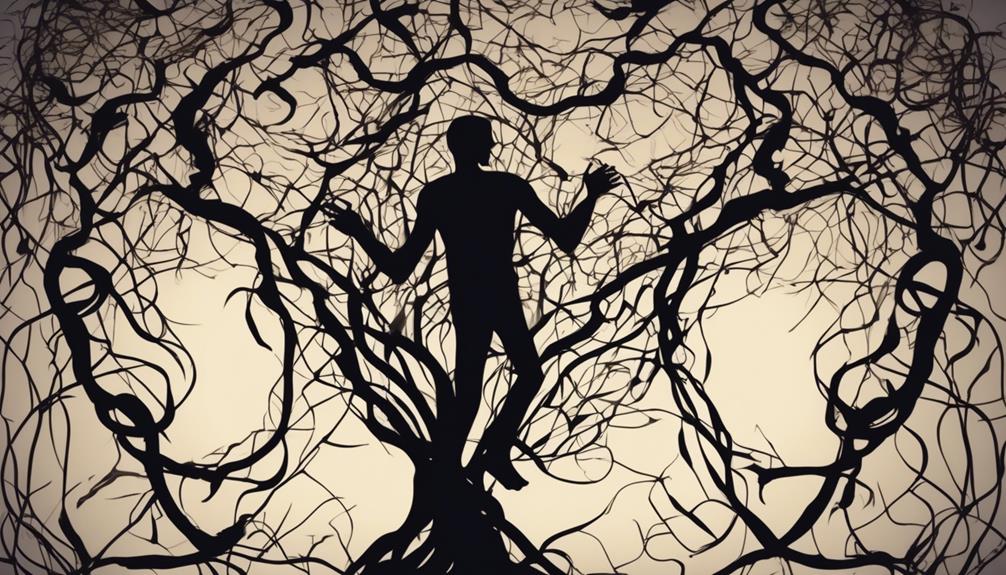10 Warning Signs of Toxic Relationship Patterns You Should Recognize
They say that love is blind, but sometimes it’s more than just rose-colored glasses. Toxic relationship patterns can creep into even the most seemingly perfect partnerships, leaving lasting damage in their wake.
So how can you navigate the treacherous waters of toxic relationships? Beware of the red flags, those warning signs that something isn’t quite right. From communication breakdowns to control and manipulation tactics, these patterns can slowly erode the foundation of a healthy relationship.
But don’t worry, there is hope. By understanding the emotional rollercoasters and the cycle of toxicity, you can empower yourself to break free from the chains that bind you.
Red Flags to Watch For

Keep a watchful eye out for these red flags in order to recognize toxic relationship patterns.
One of the key signs of gaslighting is when your partner consistently manipulates and distorts your perception of reality. They may deny things they said or did, making you doubt your own memory and sanity.
Another red flag is the presence of power imbalances and inequality in the relationship. You may notice that your partner constantly undermines your opinions, belittles your achievements, or controls your decisions. They may make you feel inadequate or inferior, leaving you feeling powerless and trapped.
Recognizing these warning signs is crucial in identifying toxic relationship patterns and taking the necessary steps to safeguard your mental and emotional well-being.
Communication Breakdowns

Recognizing signs of communication breakdowns is essential in identifying toxic relationship patterns. When it comes to toxic relationships, communication often becomes strained and ineffective. One major red flag is the lack of empathy building. In a healthy relationship, both partners should be able to understand and validate each other’s emotions. However, in toxic relationships, one or both partners may dismiss or ignore the other’s feelings, leading to a breakdown in communication.
Another key indicator is the inability to resolve conflicts in a healthy manner. Toxic relationships often involve constant arguments, defensiveness, and a refusal to address or resolve issues. These communication breakdowns can create a toxic environment that fosters negativity and can ultimately lead to the deterioration of the relationship.
Control and Manipulation Tactics

In order to fully understand the toxic dynamics of a relationship, it is crucial to recognize the control and manipulation tactics employed by one or both partners. These tactics can be subtle yet destructive, leaving the victim feeling powerless and trapped. Gaslighting techniques, for example, involve manipulating the victim’s perception of reality, causing them to doubt their own thoughts and feelings. This psychological manipulation erodes their self-esteem and undermines their ability to trust their own judgment. Power dynamics also play a significant role in controlling and manipulating the victim. The manipulator seeks to establish dominance and control over the other person, using various tactics to maintain their power. By recognizing these tactics, individuals can empower themselves to break free from toxic relationships and seek healthier, more fulfilling connections.
| Control and Manipulation Tactics | Impact on the Victim |
|---|---|
| Gaslighting Techniques | Erodes self-esteem, undermines trust in own judgment |
| Power Dynamics | Leaves victim feeling powerless and trapped |
Emotional Rollercoasters

Experiencing a whirlwind of unpredictable emotions can be a common occurrence in toxic relationships. When you find yourself on an emotional rollercoaster, it can leave you feeling exhausted and confused. Here are some key points to consider about this toxic relationship pattern:
- Emotional instability:
- Toxic partners often exhibit extreme mood swings, from love and affection to anger and hostility, creating an unstable emotional environment.
- They may manipulate your emotions by constantly shifting blame or guilt, making it difficult for you to maintain a sense of stability and security.
- This constant emotional turmoil can lead to feelings of anxiety, depression, and low self-esteem.
- Impact on mental health:
- The constant ups and downs can take a toll on your mental health, leaving you feeling emotionally drained and overwhelmed.
- It can lead to a constant state of fear and uncertainty, as you never know what mood your partner will be in.
- This emotional rollercoaster can also make it challenging to trust your own feelings and judgment, further impacting your mental well-being.
The Cycle of Toxicity

Navigating through the emotional rollercoaster of a toxic relationship can be exhausting, but understanding the cycle of toxicity is crucial in breaking free from its harmful grip. The cycle of toxicity is a repetitive pattern that keeps you trapped in the same destructive behavior, preventing any chance of rebuilding trust or breaking the cycle. It starts with tension building, where small arguments escalate and tension fills the air. This is followed by an explosive event, where emotions reach their peak, resulting in verbal or physical abuse. Then comes the honeymoon phase, where the abuser shows remorse and promises change. However, this is short-lived, leading back to tension building once again. Breaking the cycle requires recognizing the pattern, seeking support, and making the difficult decision to leave the toxic relationship behind.
| Tension Building | Explosive Event | Honeymoon Phase |
|---|---|---|
| Arguments and conflicts escalate | Verbal or physical abuse occurs | Abuser shows remorse and promises change |
| Fear and anxiety increase | Emotions reach their peak | Victim believes things will improve |
| Walking on eggshells | Intense anger and aggression | Temporary relief and harmony |
| Communication breakdown | Loss of control | Hope for a better future |
Conclusion
So, next time you find yourself in a relationship, keep an eye out for these toxic patterns. Recognizing the red flags, communication breakdowns, control and manipulation tactics, and emotional rollercoasters is crucial in order to protect your mental and emotional well-being.
Break the cycle of toxicity and prioritize your own happiness and growth. Remember, you deserve a healthy and supportive relationship.